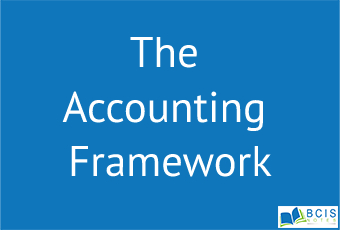
The Accounting Framework
An accounting framework is a published set of criteria that is used to measure, recognize, present, and disclose the information appearing in an entity’s financial statements. An organization’s financial statements must have been constructed using a recognized framework, or else auditors will not issue a clean audit opinion for them. The theoretical framework of Accounting refers to the set of frameworks, methods, and assumptions used in the study and application of accounts in financial situations.
Basic accounting assumptions
Accounting assumptions state how a business is organized and operates. They provide structure to how business transactions are recorded. If any of these assumptions are not true, it may be necessary to alter the financial information produced by a business and reported in its financial statements. These assumptions are:
- Accrual assumption: Transactions are recorded using the accrual basis of accounting, where the recognition of revenues and expenses arises when earned or used, respectively. If this assumption is not true, a business should instead use the cash basis of accounting to develop financial statements that are based on cash flows. The latter approach will not result in financial statements that can be audited.
- Conservatism assumption: Revenues and expenses should be recognized when earned, but there is a bias toward earlier recognition of expenses. If this assumption is not true, a business may be issuing overly optimistic financial results.
- Consistency assumption: The same method of accounting will be used from period to period unless it can be replaced by a more relevant method. If this assumption is not true, the financial statements produced over multiple periods are probably not comparable.
- Economic entity assumption: The transactions of a business and those of its owners are not intermingled. If this assumption is not true, it is impossible to develop accurate financial statements. This assumption is a particular problem for small, family-owned businesses.
- Going concern assumption: A business will continue to operate for the foreseeable future. If this assumption is not true (such as when bankruptcy appears probable), deferred expenses should be recognized at once.
- Reliability assumption: Only those transactions that can be adequately proven should be recorded. If this assumption is not true, a business is probably artificially accelerating the recognition of revenue to bolster its short-term results.
- Time period assumption: The financial results reported by a business should cover a uniform and consistent period of time. If this is not the case, financial statements will not be comparable across reporting periods.
GAAP (Generally Accepted Accounting Principles)
Generally accepted accounting principles (GAAP) refer to a common set of accounting principles, standards, and procedures issued by the Financial Accounting Standards Board (FASB). Public companies in the United States must follow GAAP when their accountants compile their financial statements. GAAP is a combination of authoritative standards (set by policy boards) and the commonly accepted ways of recording and reporting accounting information. GAAP aims to improve the clarity, consistency, and comparability of the communication of financial information. GAAP helps govern the world of accounting according to general rules and guidelines. It attempts to standardize and regulate the definitions, assumptions, and methods used in accounting across all industries. GAAP covers such topics as revenue recognition, balance sheet classification, and materiality.
Accounting information system in modern business organizations
An accounting Information System is software that a business uses in collecting, storing, and processing financial data that are used for decision-making. To simplify, Accounting Information System gives accurate data to the managers before making any significant decisions that will either make or break their business. The purpose of an accounting information system (AIS) is to collect, store, and process financial and accounting data and produce informational reports that managers or other interested parties can use to make business decisions.
Development of AIS includes five basic phases:
- Planning
- Analysis
- Design
- Implementation
- Support
You may also like The Accounting Profession

Leave a Reply